The Legal Systems: Dispute Resolution in the Marine Industry
VerifiedAdded on 2022/10/01
|9
|2440
|400
Report
AI Summary
This report delves into the legal systems that govern the marine industry, highlighting the importance of regulation for fair practices. It examines primary sources of law such as parliament, statutory laws, and delegated legislation, emphasizing their role in dispute resolution. The report also explores judicial precedence, customs, and the application of recent laws in contract breach cases. Furthermore, it discusses liability in tort and contract, including the significance of negligence. Insurance policies like hull and machinery cover, protection and indemnity cover, particular average, and general average are analyzed, alongside the concept of free reserves. The report concludes by defining salvage in the marine industry and its environmental and safety implications. The assignment offers a comprehensive understanding of the legal aspects of the marine sector.
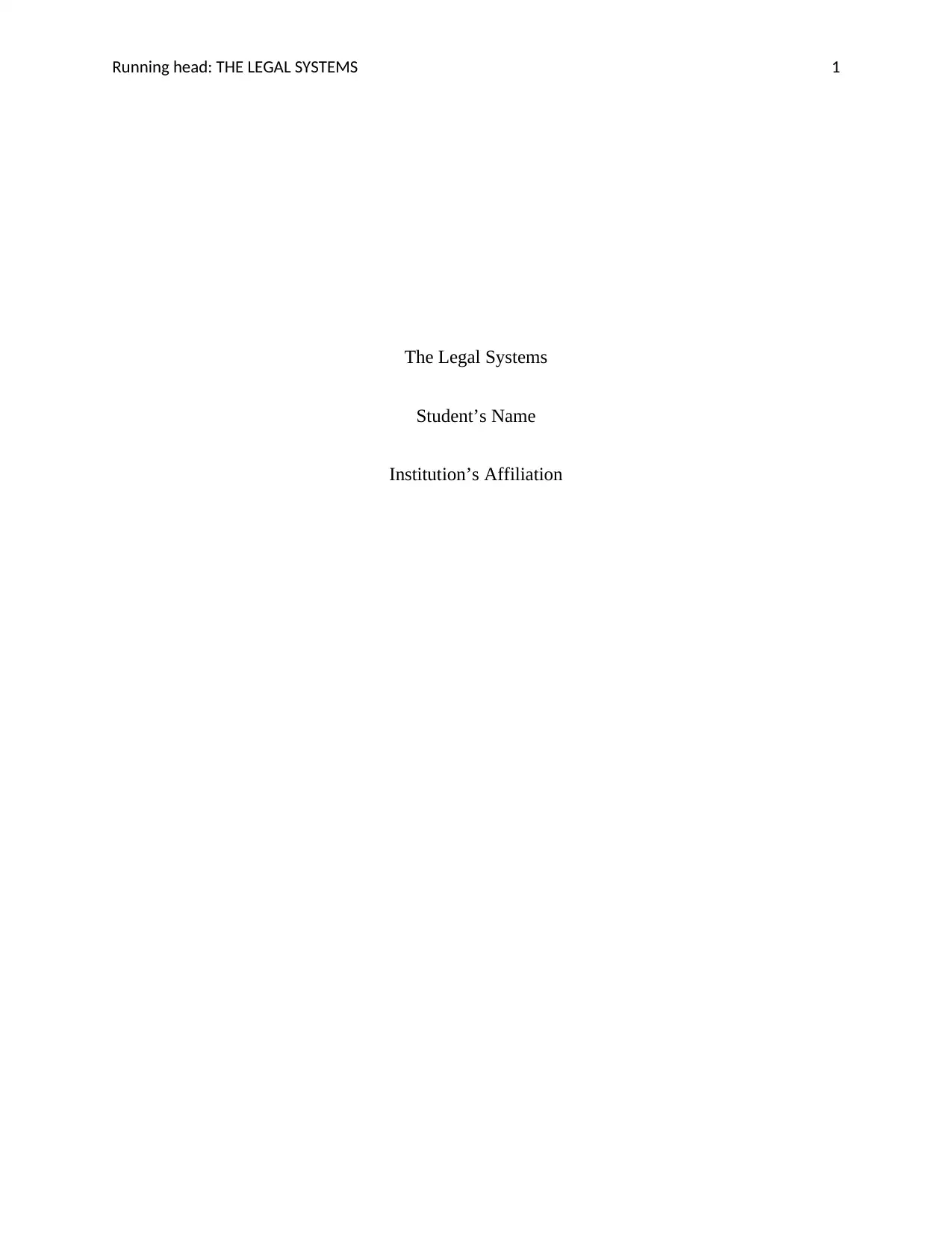
Running head: THE LEGAL SYSTEMS 1
The Legal Systems
Student’s Name
Institution’s Affiliation
The Legal Systems
Student’s Name
Institution’s Affiliation
Paraphrase This Document
Need a fresh take? Get an instant paraphrase of this document with our AI Paraphraser
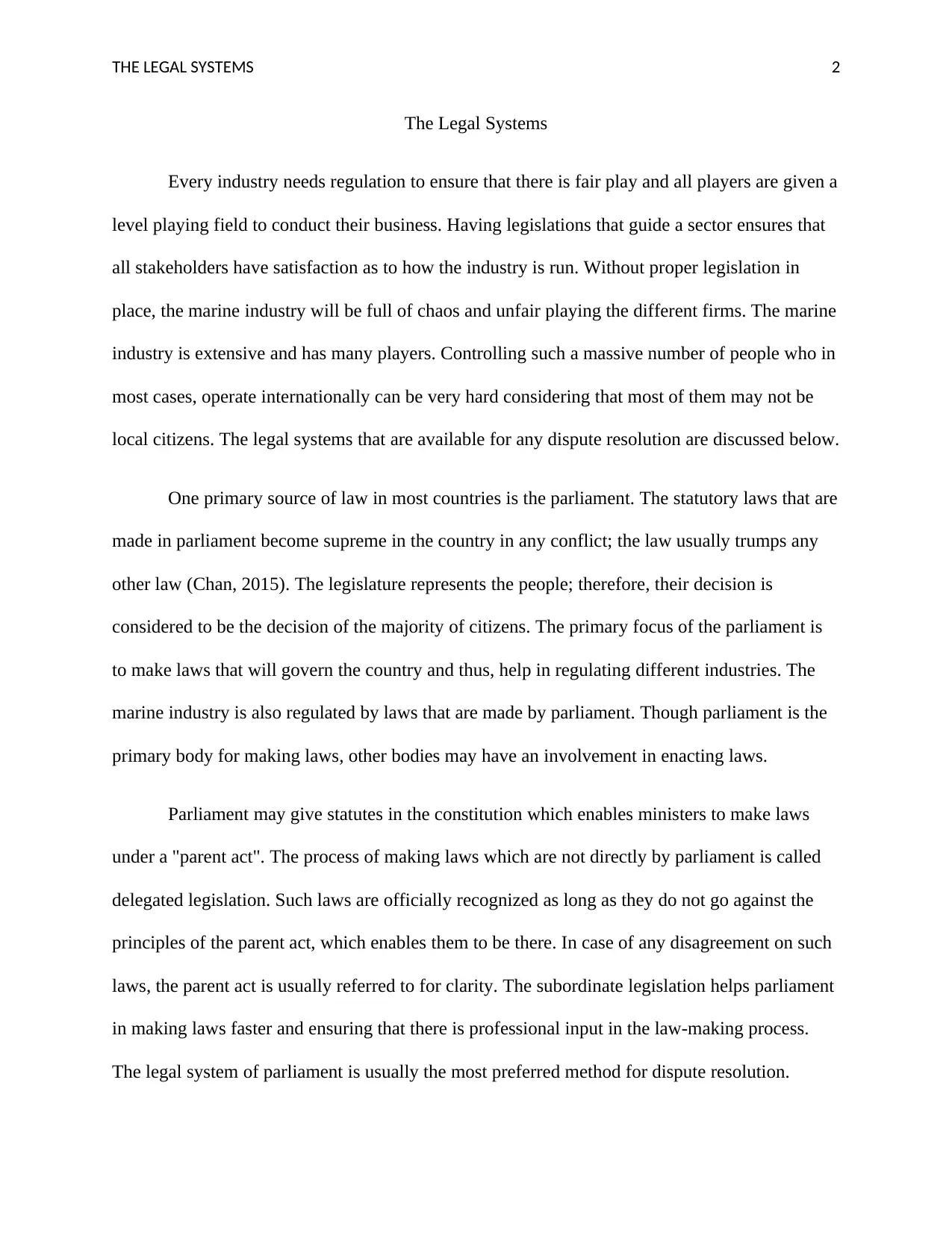
THE LEGAL SYSTEMS 2
The Legal Systems
Every industry needs regulation to ensure that there is fair play and all players are given a
level playing field to conduct their business. Having legislations that guide a sector ensures that
all stakeholders have satisfaction as to how the industry is run. Without proper legislation in
place, the marine industry will be full of chaos and unfair playing the different firms. The marine
industry is extensive and has many players. Controlling such a massive number of people who in
most cases, operate internationally can be very hard considering that most of them may not be
local citizens. The legal systems that are available for any dispute resolution are discussed below.
One primary source of law in most countries is the parliament. The statutory laws that are
made in parliament become supreme in the country in any conflict; the law usually trumps any
other law (Chan, 2015). The legislature represents the people; therefore, their decision is
considered to be the decision of the majority of citizens. The primary focus of the parliament is
to make laws that will govern the country and thus, help in regulating different industries. The
marine industry is also regulated by laws that are made by parliament. Though parliament is the
primary body for making laws, other bodies may have an involvement in enacting laws.
Parliament may give statutes in the constitution which enables ministers to make laws
under a "parent act". The process of making laws which are not directly by parliament is called
delegated legislation. Such laws are officially recognized as long as they do not go against the
principles of the parent act, which enables them to be there. In case of any disagreement on such
laws, the parent act is usually referred to for clarity. The subordinate legislation helps parliament
in making laws faster and ensuring that there is professional input in the law-making process.
The legal system of parliament is usually the most preferred method for dispute resolution.
The Legal Systems
Every industry needs regulation to ensure that there is fair play and all players are given a
level playing field to conduct their business. Having legislations that guide a sector ensures that
all stakeholders have satisfaction as to how the industry is run. Without proper legislation in
place, the marine industry will be full of chaos and unfair playing the different firms. The marine
industry is extensive and has many players. Controlling such a massive number of people who in
most cases, operate internationally can be very hard considering that most of them may not be
local citizens. The legal systems that are available for any dispute resolution are discussed below.
One primary source of law in most countries is the parliament. The statutory laws that are
made in parliament become supreme in the country in any conflict; the law usually trumps any
other law (Chan, 2015). The legislature represents the people; therefore, their decision is
considered to be the decision of the majority of citizens. The primary focus of the parliament is
to make laws that will govern the country and thus, help in regulating different industries. The
marine industry is also regulated by laws that are made by parliament. Though parliament is the
primary body for making laws, other bodies may have an involvement in enacting laws.
Parliament may give statutes in the constitution which enables ministers to make laws
under a "parent act". The process of making laws which are not directly by parliament is called
delegated legislation. Such laws are officially recognized as long as they do not go against the
principles of the parent act, which enables them to be there. In case of any disagreement on such
laws, the parent act is usually referred to for clarity. The subordinate legislation helps parliament
in making laws faster and ensuring that there is professional input in the law-making process.
The legal system of parliament is usually the most preferred method for dispute resolution.
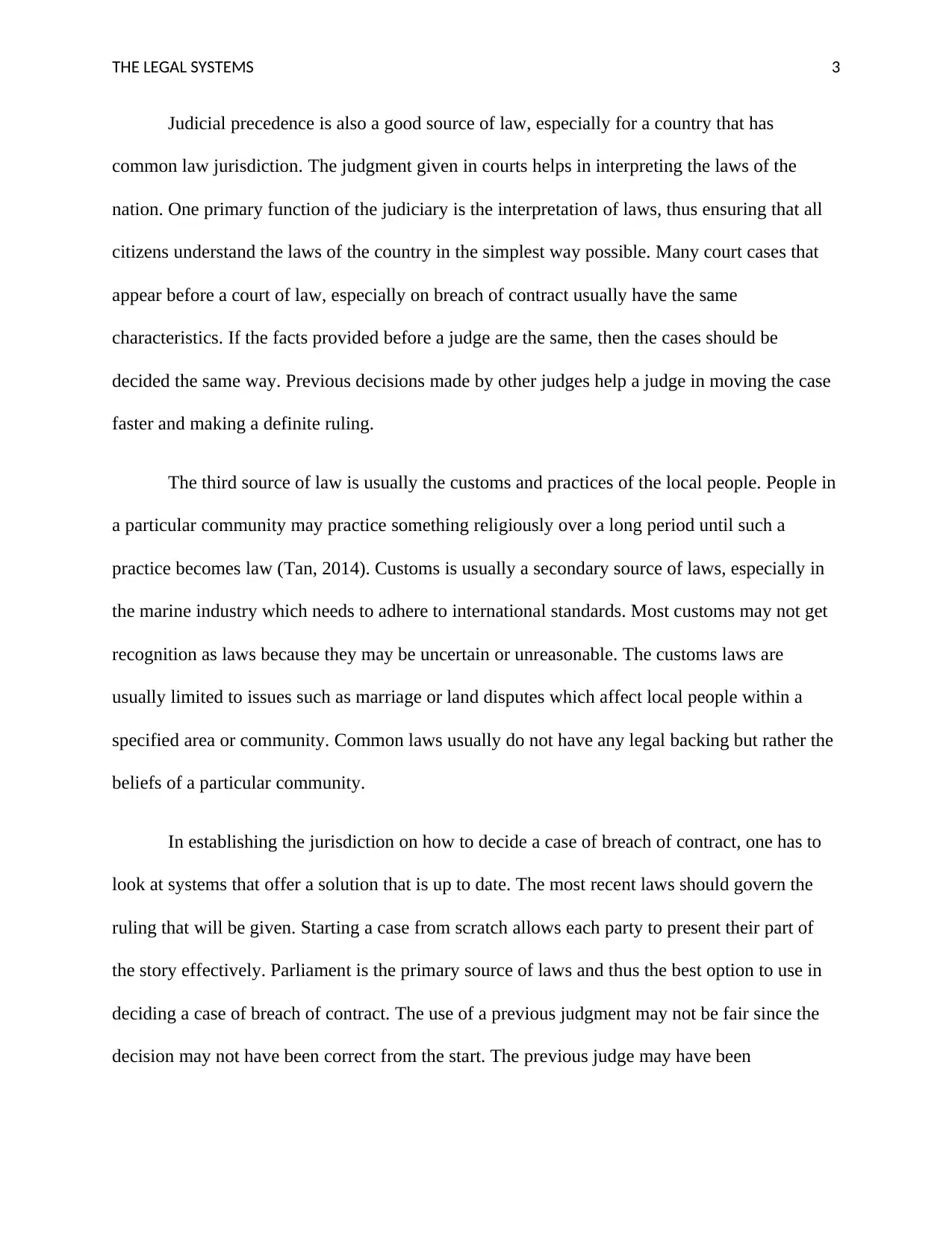
THE LEGAL SYSTEMS 3
Judicial precedence is also a good source of law, especially for a country that has
common law jurisdiction. The judgment given in courts helps in interpreting the laws of the
nation. One primary function of the judiciary is the interpretation of laws, thus ensuring that all
citizens understand the laws of the country in the simplest way possible. Many court cases that
appear before a court of law, especially on breach of contract usually have the same
characteristics. If the facts provided before a judge are the same, then the cases should be
decided the same way. Previous decisions made by other judges help a judge in moving the case
faster and making a definite ruling.
The third source of law is usually the customs and practices of the local people. People in
a particular community may practice something religiously over a long period until such a
practice becomes law (Tan, 2014). Customs is usually a secondary source of laws, especially in
the marine industry which needs to adhere to international standards. Most customs may not get
recognition as laws because they may be uncertain or unreasonable. The customs laws are
usually limited to issues such as marriage or land disputes which affect local people within a
specified area or community. Common laws usually do not have any legal backing but rather the
beliefs of a particular community.
In establishing the jurisdiction on how to decide a case of breach of contract, one has to
look at systems that offer a solution that is up to date. The most recent laws should govern the
ruling that will be given. Starting a case from scratch allows each party to present their part of
the story effectively. Parliament is the primary source of laws and thus the best option to use in
deciding a case of breach of contract. The use of a previous judgment may not be fair since the
decision may not have been correct from the start. The previous judge may have been
Judicial precedence is also a good source of law, especially for a country that has
common law jurisdiction. The judgment given in courts helps in interpreting the laws of the
nation. One primary function of the judiciary is the interpretation of laws, thus ensuring that all
citizens understand the laws of the country in the simplest way possible. Many court cases that
appear before a court of law, especially on breach of contract usually have the same
characteristics. If the facts provided before a judge are the same, then the cases should be
decided the same way. Previous decisions made by other judges help a judge in moving the case
faster and making a definite ruling.
The third source of law is usually the customs and practices of the local people. People in
a particular community may practice something religiously over a long period until such a
practice becomes law (Tan, 2014). Customs is usually a secondary source of laws, especially in
the marine industry which needs to adhere to international standards. Most customs may not get
recognition as laws because they may be uncertain or unreasonable. The customs laws are
usually limited to issues such as marriage or land disputes which affect local people within a
specified area or community. Common laws usually do not have any legal backing but rather the
beliefs of a particular community.
In establishing the jurisdiction on how to decide a case of breach of contract, one has to
look at systems that offer a solution that is up to date. The most recent laws should govern the
ruling that will be given. Starting a case from scratch allows each party to present their part of
the story effectively. Parliament is the primary source of laws and thus the best option to use in
deciding a case of breach of contract. The use of a previous judgment may not be fair since the
decision may not have been correct from the start. The previous judge may have been
⊘ This is a preview!⊘
Do you want full access?
Subscribe today to unlock all pages.

Trusted by 1+ million students worldwide
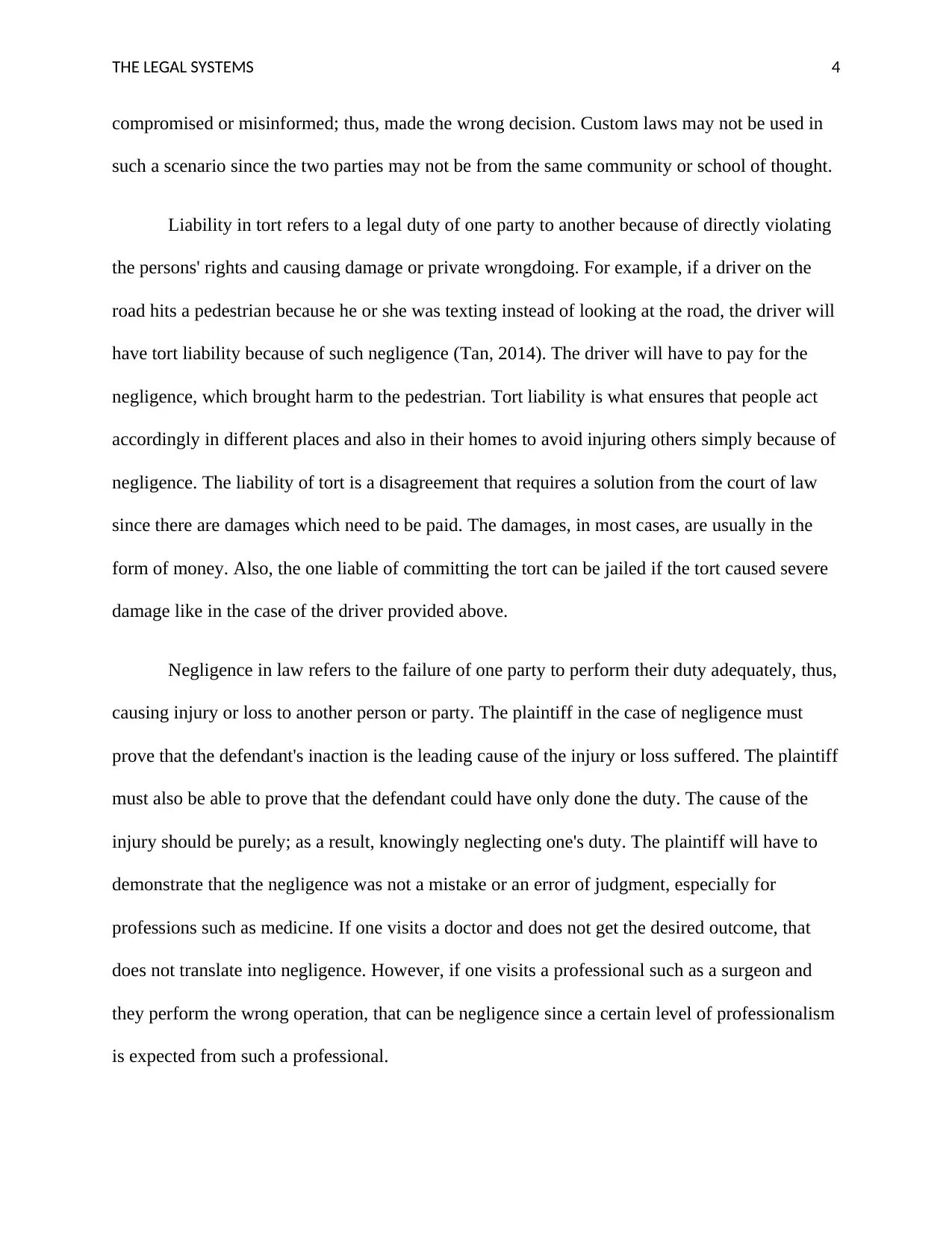
THE LEGAL SYSTEMS 4
compromised or misinformed; thus, made the wrong decision. Custom laws may not be used in
such a scenario since the two parties may not be from the same community or school of thought.
Liability in tort refers to a legal duty of one party to another because of directly violating
the persons' rights and causing damage or private wrongdoing. For example, if a driver on the
road hits a pedestrian because he or she was texting instead of looking at the road, the driver will
have tort liability because of such negligence (Tan, 2014). The driver will have to pay for the
negligence, which brought harm to the pedestrian. Tort liability is what ensures that people act
accordingly in different places and also in their homes to avoid injuring others simply because of
negligence. The liability of tort is a disagreement that requires a solution from the court of law
since there are damages which need to be paid. The damages, in most cases, are usually in the
form of money. Also, the one liable of committing the tort can be jailed if the tort caused severe
damage like in the case of the driver provided above.
Negligence in law refers to the failure of one party to perform their duty adequately, thus,
causing injury or loss to another person or party. The plaintiff in the case of negligence must
prove that the defendant's inaction is the leading cause of the injury or loss suffered. The plaintiff
must also be able to prove that the defendant could have only done the duty. The cause of the
injury should be purely; as a result, knowingly neglecting one's duty. The plaintiff will have to
demonstrate that the negligence was not a mistake or an error of judgment, especially for
professions such as medicine. If one visits a doctor and does not get the desired outcome, that
does not translate into negligence. However, if one visits a professional such as a surgeon and
they perform the wrong operation, that can be negligence since a certain level of professionalism
is expected from such a professional.
compromised or misinformed; thus, made the wrong decision. Custom laws may not be used in
such a scenario since the two parties may not be from the same community or school of thought.
Liability in tort refers to a legal duty of one party to another because of directly violating
the persons' rights and causing damage or private wrongdoing. For example, if a driver on the
road hits a pedestrian because he or she was texting instead of looking at the road, the driver will
have tort liability because of such negligence (Tan, 2014). The driver will have to pay for the
negligence, which brought harm to the pedestrian. Tort liability is what ensures that people act
accordingly in different places and also in their homes to avoid injuring others simply because of
negligence. The liability of tort is a disagreement that requires a solution from the court of law
since there are damages which need to be paid. The damages, in most cases, are usually in the
form of money. Also, the one liable of committing the tort can be jailed if the tort caused severe
damage like in the case of the driver provided above.
Negligence in law refers to the failure of one party to perform their duty adequately, thus,
causing injury or loss to another person or party. The plaintiff in the case of negligence must
prove that the defendant's inaction is the leading cause of the injury or loss suffered. The plaintiff
must also be able to prove that the defendant could have only done the duty. The cause of the
injury should be purely; as a result, knowingly neglecting one's duty. The plaintiff will have to
demonstrate that the negligence was not a mistake or an error of judgment, especially for
professions such as medicine. If one visits a doctor and does not get the desired outcome, that
does not translate into negligence. However, if one visits a professional such as a surgeon and
they perform the wrong operation, that can be negligence since a certain level of professionalism
is expected from such a professional.
Paraphrase This Document
Need a fresh take? Get an instant paraphrase of this document with our AI Paraphraser
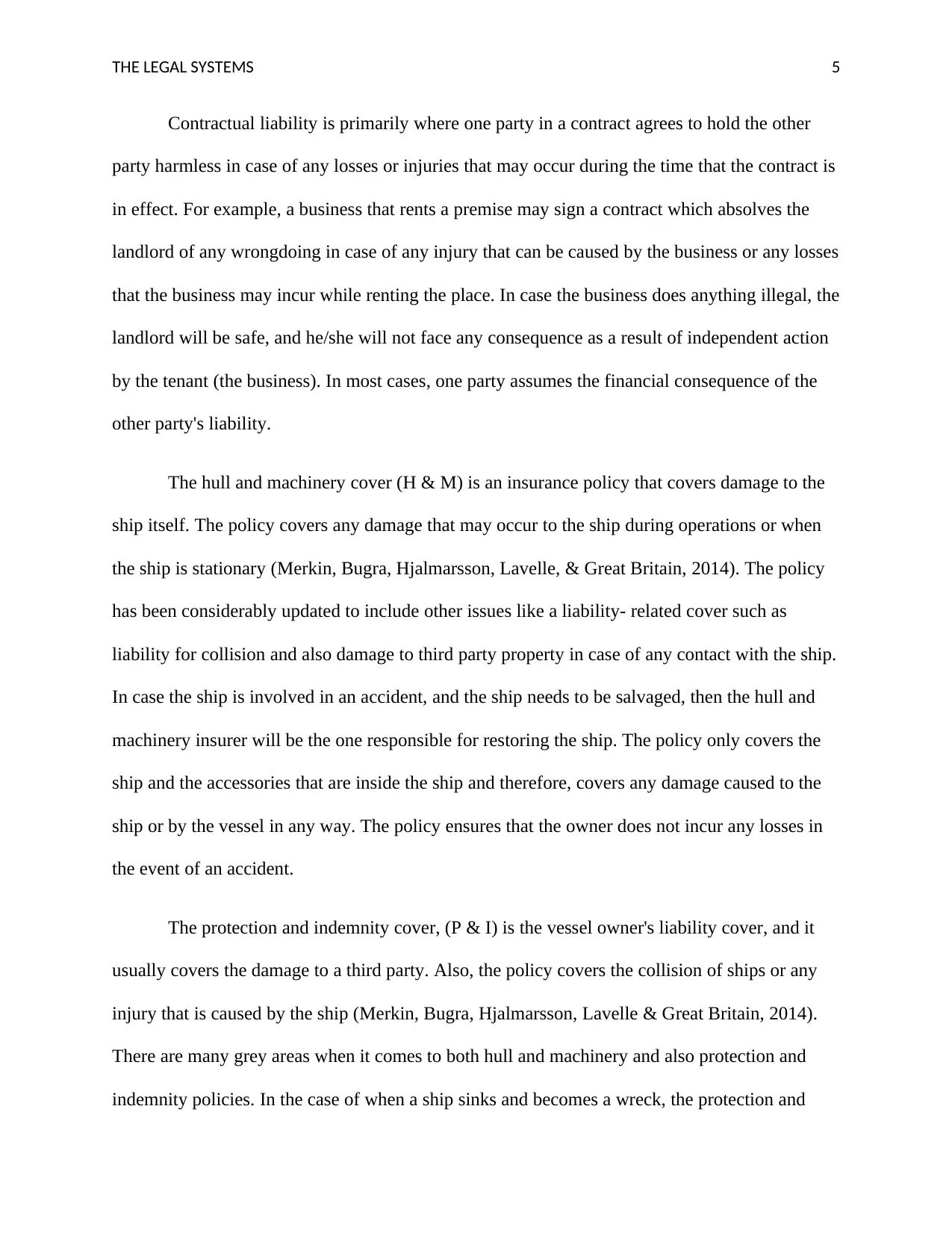
THE LEGAL SYSTEMS 5
Contractual liability is primarily where one party in a contract agrees to hold the other
party harmless in case of any losses or injuries that may occur during the time that the contract is
in effect. For example, a business that rents a premise may sign a contract which absolves the
landlord of any wrongdoing in case of any injury that can be caused by the business or any losses
that the business may incur while renting the place. In case the business does anything illegal, the
landlord will be safe, and he/she will not face any consequence as a result of independent action
by the tenant (the business). In most cases, one party assumes the financial consequence of the
other party's liability.
The hull and machinery cover (H & M) is an insurance policy that covers damage to the
ship itself. The policy covers any damage that may occur to the ship during operations or when
the ship is stationary (Merkin, Bugra, Hjalmarsson, Lavelle, & Great Britain, 2014). The policy
has been considerably updated to include other issues like a liability- related cover such as
liability for collision and also damage to third party property in case of any contact with the ship.
In case the ship is involved in an accident, and the ship needs to be salvaged, then the hull and
machinery insurer will be the one responsible for restoring the ship. The policy only covers the
ship and the accessories that are inside the ship and therefore, covers any damage caused to the
ship or by the vessel in any way. The policy ensures that the owner does not incur any losses in
the event of an accident.
The protection and indemnity cover, (P & I) is the vessel owner's liability cover, and it
usually covers the damage to a third party. Also, the policy covers the collision of ships or any
injury that is caused by the ship (Merkin, Bugra, Hjalmarsson, Lavelle & Great Britain, 2014).
There are many grey areas when it comes to both hull and machinery and also protection and
indemnity policies. In the case of when a ship sinks and becomes a wreck, the protection and
Contractual liability is primarily where one party in a contract agrees to hold the other
party harmless in case of any losses or injuries that may occur during the time that the contract is
in effect. For example, a business that rents a premise may sign a contract which absolves the
landlord of any wrongdoing in case of any injury that can be caused by the business or any losses
that the business may incur while renting the place. In case the business does anything illegal, the
landlord will be safe, and he/she will not face any consequence as a result of independent action
by the tenant (the business). In most cases, one party assumes the financial consequence of the
other party's liability.
The hull and machinery cover (H & M) is an insurance policy that covers damage to the
ship itself. The policy covers any damage that may occur to the ship during operations or when
the ship is stationary (Merkin, Bugra, Hjalmarsson, Lavelle, & Great Britain, 2014). The policy
has been considerably updated to include other issues like a liability- related cover such as
liability for collision and also damage to third party property in case of any contact with the ship.
In case the ship is involved in an accident, and the ship needs to be salvaged, then the hull and
machinery insurer will be the one responsible for restoring the ship. The policy only covers the
ship and the accessories that are inside the ship and therefore, covers any damage caused to the
ship or by the vessel in any way. The policy ensures that the owner does not incur any losses in
the event of an accident.
The protection and indemnity cover, (P & I) is the vessel owner's liability cover, and it
usually covers the damage to a third party. Also, the policy covers the collision of ships or any
injury that is caused by the ship (Merkin, Bugra, Hjalmarsson, Lavelle & Great Britain, 2014).
There are many grey areas when it comes to both hull and machinery and also protection and
indemnity policies. In the case of when a ship sinks and becomes a wreck, the protection and
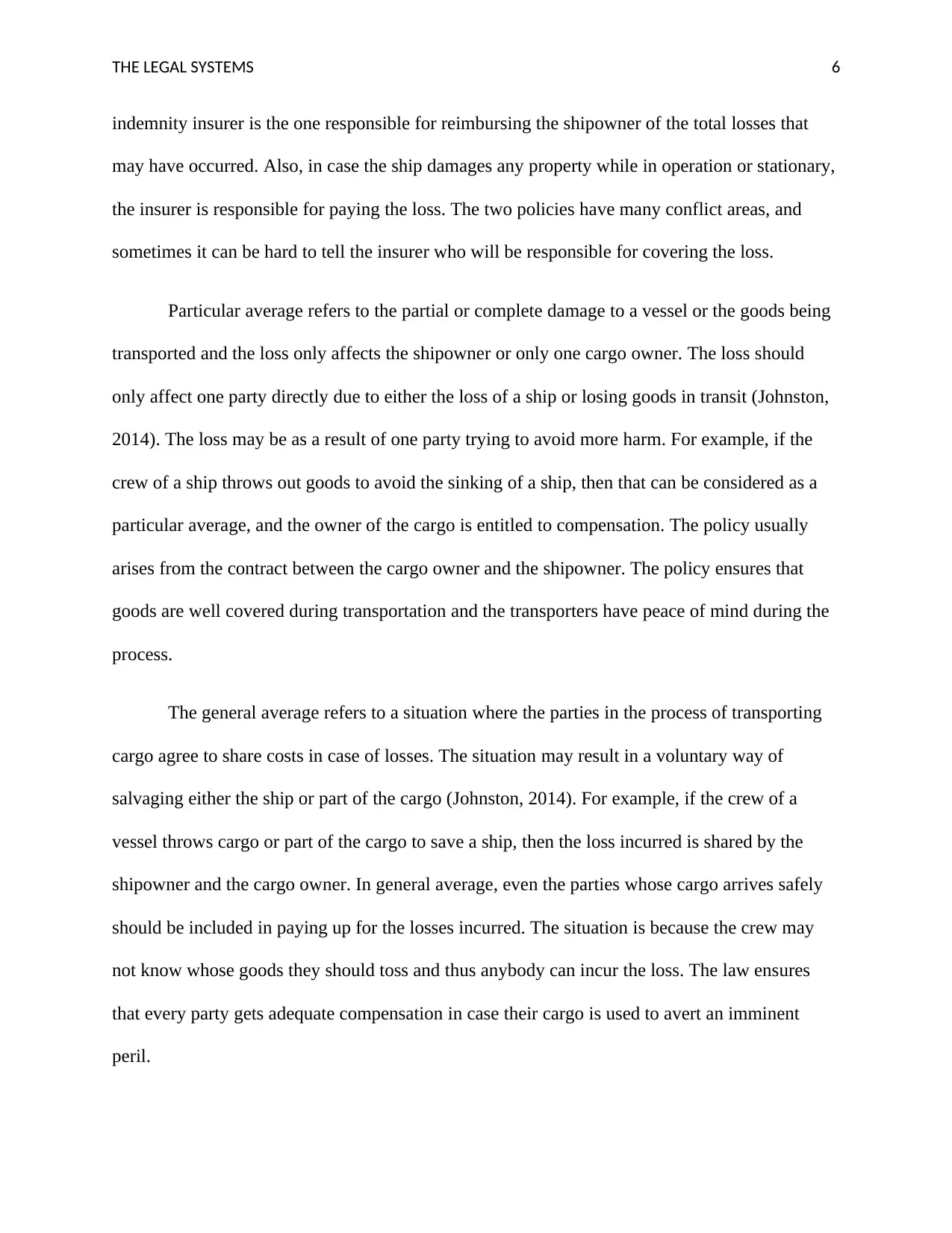
THE LEGAL SYSTEMS 6
indemnity insurer is the one responsible for reimbursing the shipowner of the total losses that
may have occurred. Also, in case the ship damages any property while in operation or stationary,
the insurer is responsible for paying the loss. The two policies have many conflict areas, and
sometimes it can be hard to tell the insurer who will be responsible for covering the loss.
Particular average refers to the partial or complete damage to a vessel or the goods being
transported and the loss only affects the shipowner or only one cargo owner. The loss should
only affect one party directly due to either the loss of a ship or losing goods in transit (Johnston,
2014). The loss may be as a result of one party trying to avoid more harm. For example, if the
crew of a ship throws out goods to avoid the sinking of a ship, then that can be considered as a
particular average, and the owner of the cargo is entitled to compensation. The policy usually
arises from the contract between the cargo owner and the shipowner. The policy ensures that
goods are well covered during transportation and the transporters have peace of mind during the
process.
The general average refers to a situation where the parties in the process of transporting
cargo agree to share costs in case of losses. The situation may result in a voluntary way of
salvaging either the ship or part of the cargo (Johnston, 2014). For example, if the crew of a
vessel throws cargo or part of the cargo to save a ship, then the loss incurred is shared by the
shipowner and the cargo owner. In general average, even the parties whose cargo arrives safely
should be included in paying up for the losses incurred. The situation is because the crew may
not know whose goods they should toss and thus anybody can incur the loss. The law ensures
that every party gets adequate compensation in case their cargo is used to avert an imminent
peril.
indemnity insurer is the one responsible for reimbursing the shipowner of the total losses that
may have occurred. Also, in case the ship damages any property while in operation or stationary,
the insurer is responsible for paying the loss. The two policies have many conflict areas, and
sometimes it can be hard to tell the insurer who will be responsible for covering the loss.
Particular average refers to the partial or complete damage to a vessel or the goods being
transported and the loss only affects the shipowner or only one cargo owner. The loss should
only affect one party directly due to either the loss of a ship or losing goods in transit (Johnston,
2014). The loss may be as a result of one party trying to avoid more harm. For example, if the
crew of a ship throws out goods to avoid the sinking of a ship, then that can be considered as a
particular average, and the owner of the cargo is entitled to compensation. The policy usually
arises from the contract between the cargo owner and the shipowner. The policy ensures that
goods are well covered during transportation and the transporters have peace of mind during the
process.
The general average refers to a situation where the parties in the process of transporting
cargo agree to share costs in case of losses. The situation may result in a voluntary way of
salvaging either the ship or part of the cargo (Johnston, 2014). For example, if the crew of a
vessel throws cargo or part of the cargo to save a ship, then the loss incurred is shared by the
shipowner and the cargo owner. In general average, even the parties whose cargo arrives safely
should be included in paying up for the losses incurred. The situation is because the crew may
not know whose goods they should toss and thus anybody can incur the loss. The law ensures
that every party gets adequate compensation in case their cargo is used to avert an imminent
peril.
⊘ This is a preview!⊘
Do you want full access?
Subscribe today to unlock all pages.

Trusted by 1+ million students worldwide
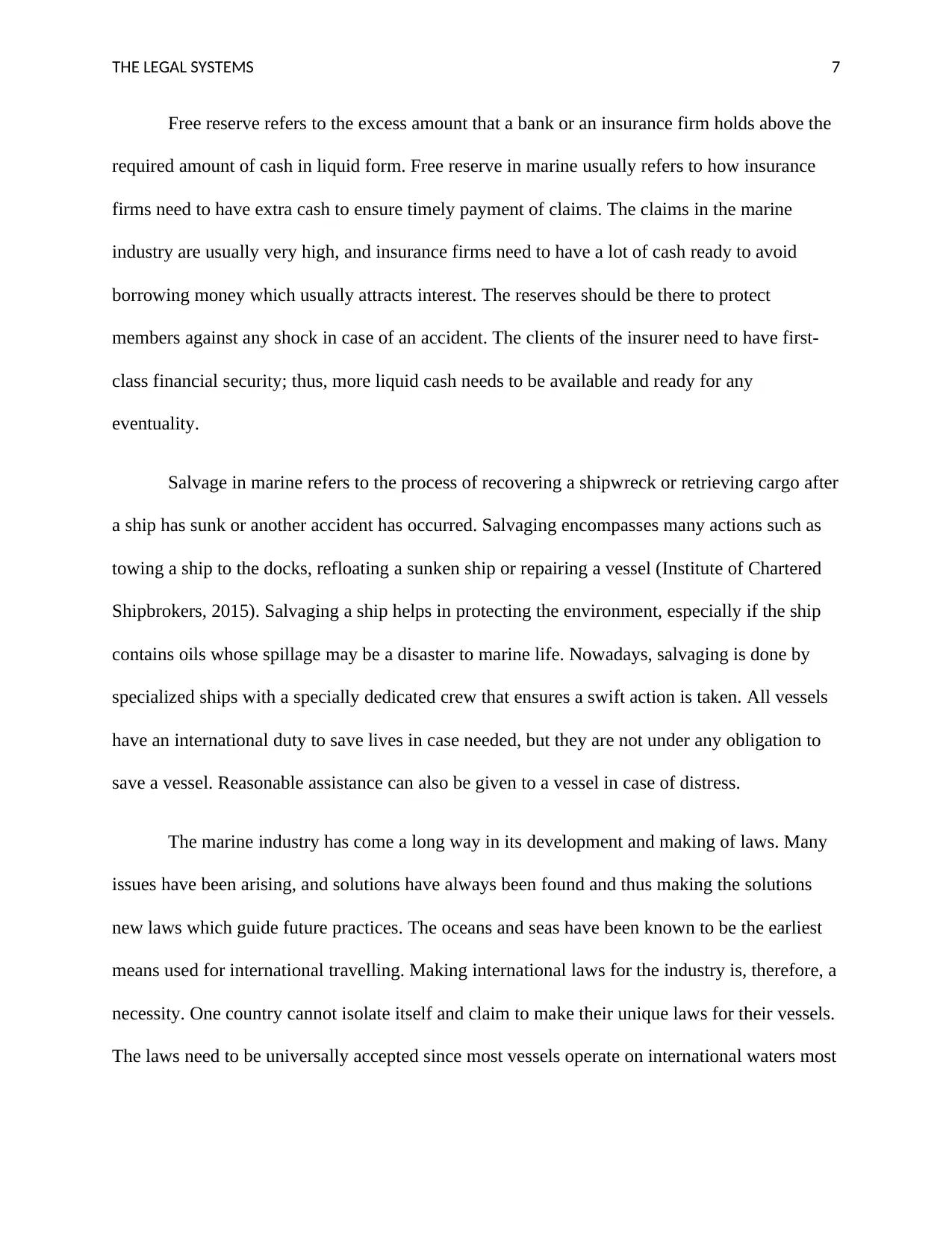
THE LEGAL SYSTEMS 7
Free reserve refers to the excess amount that a bank or an insurance firm holds above the
required amount of cash in liquid form. Free reserve in marine usually refers to how insurance
firms need to have extra cash to ensure timely payment of claims. The claims in the marine
industry are usually very high, and insurance firms need to have a lot of cash ready to avoid
borrowing money which usually attracts interest. The reserves should be there to protect
members against any shock in case of an accident. The clients of the insurer need to have first-
class financial security; thus, more liquid cash needs to be available and ready for any
eventuality.
Salvage in marine refers to the process of recovering a shipwreck or retrieving cargo after
a ship has sunk or another accident has occurred. Salvaging encompasses many actions such as
towing a ship to the docks, refloating a sunken ship or repairing a vessel (Institute of Chartered
Shipbrokers, 2015). Salvaging a ship helps in protecting the environment, especially if the ship
contains oils whose spillage may be a disaster to marine life. Nowadays, salvaging is done by
specialized ships with a specially dedicated crew that ensures a swift action is taken. All vessels
have an international duty to save lives in case needed, but they are not under any obligation to
save a vessel. Reasonable assistance can also be given to a vessel in case of distress.
The marine industry has come a long way in its development and making of laws. Many
issues have been arising, and solutions have always been found and thus making the solutions
new laws which guide future practices. The oceans and seas have been known to be the earliest
means used for international travelling. Making international laws for the industry is, therefore, a
necessity. One country cannot isolate itself and claim to make their unique laws for their vessels.
The laws need to be universally accepted since most vessels operate on international waters most
Free reserve refers to the excess amount that a bank or an insurance firm holds above the
required amount of cash in liquid form. Free reserve in marine usually refers to how insurance
firms need to have extra cash to ensure timely payment of claims. The claims in the marine
industry are usually very high, and insurance firms need to have a lot of cash ready to avoid
borrowing money which usually attracts interest. The reserves should be there to protect
members against any shock in case of an accident. The clients of the insurer need to have first-
class financial security; thus, more liquid cash needs to be available and ready for any
eventuality.
Salvage in marine refers to the process of recovering a shipwreck or retrieving cargo after
a ship has sunk or another accident has occurred. Salvaging encompasses many actions such as
towing a ship to the docks, refloating a sunken ship or repairing a vessel (Institute of Chartered
Shipbrokers, 2015). Salvaging a ship helps in protecting the environment, especially if the ship
contains oils whose spillage may be a disaster to marine life. Nowadays, salvaging is done by
specialized ships with a specially dedicated crew that ensures a swift action is taken. All vessels
have an international duty to save lives in case needed, but they are not under any obligation to
save a vessel. Reasonable assistance can also be given to a vessel in case of distress.
The marine industry has come a long way in its development and making of laws. Many
issues have been arising, and solutions have always been found and thus making the solutions
new laws which guide future practices. The oceans and seas have been known to be the earliest
means used for international travelling. Making international laws for the industry is, therefore, a
necessity. One country cannot isolate itself and claim to make their unique laws for their vessels.
The laws need to be universally accepted since most vessels operate on international waters most
Paraphrase This Document
Need a fresh take? Get an instant paraphrase of this document with our AI Paraphraser
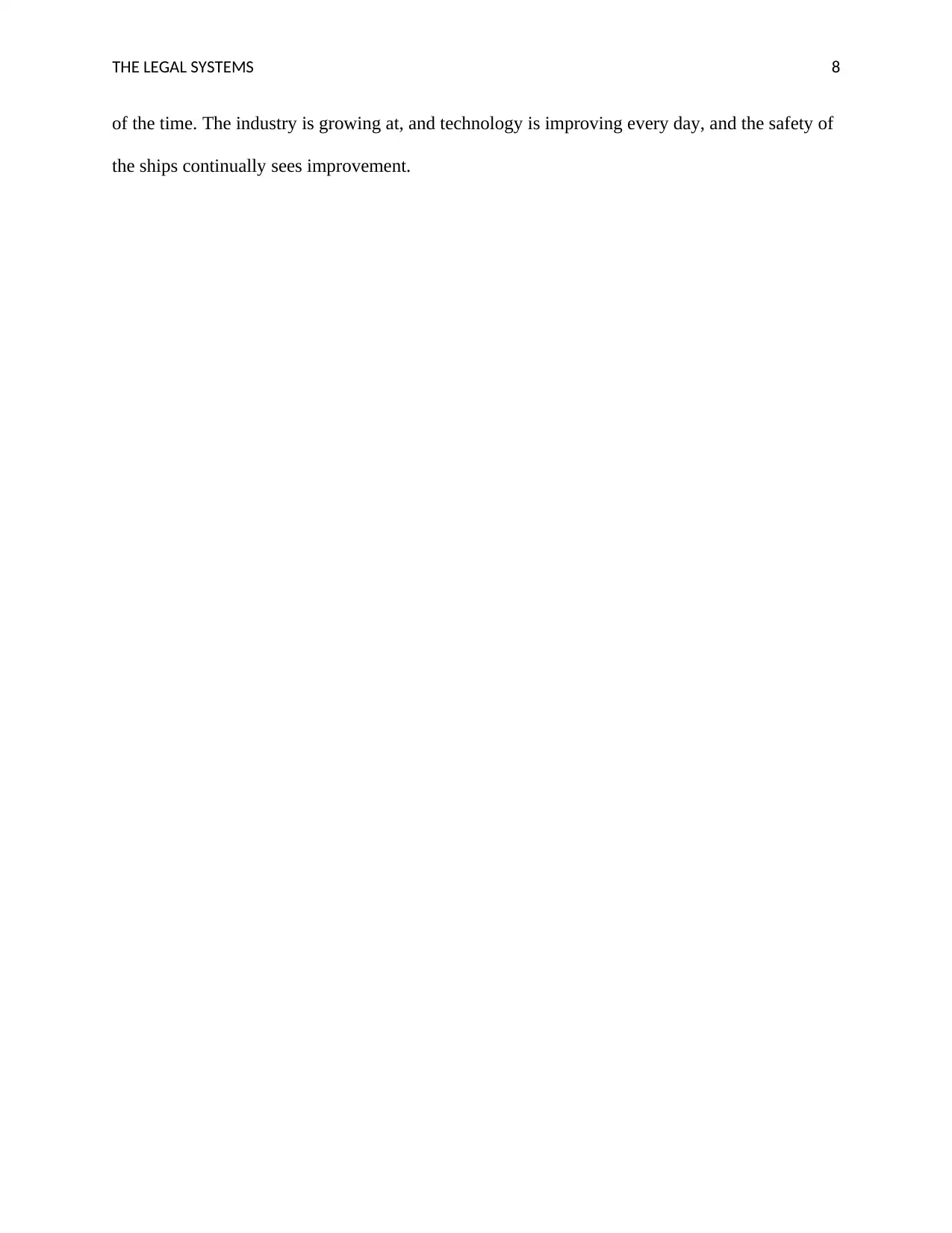
THE LEGAL SYSTEMS 8
of the time. The industry is growing at, and technology is improving every day, and the safety of
the ships continually sees improvement.
of the time. The industry is growing at, and technology is improving every day, and the safety of
the ships continually sees improvement.
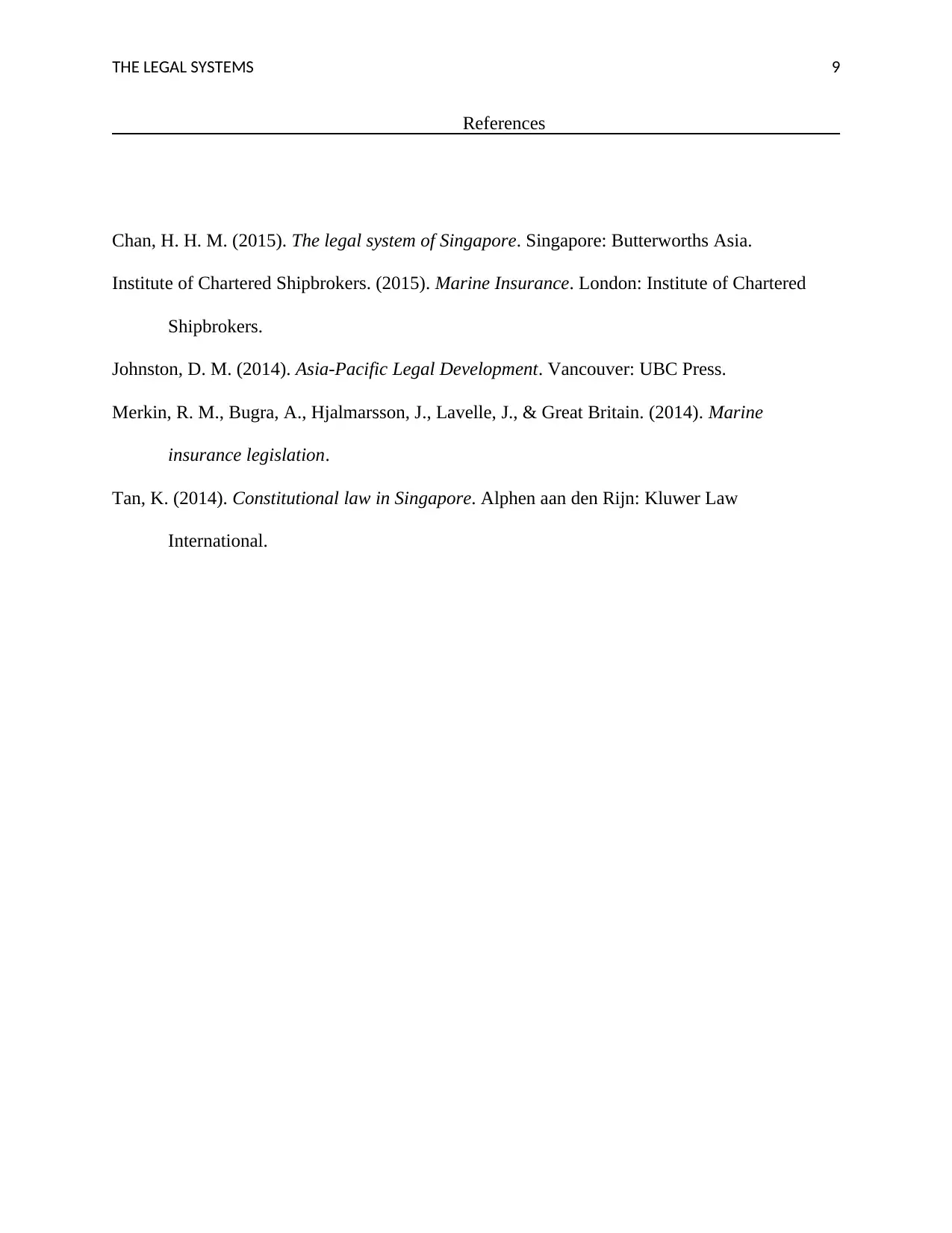
THE LEGAL SYSTEMS 9
References
Chan, H. H. M. (2015). The legal system of Singapore. Singapore: Butterworths Asia.
Institute of Chartered Shipbrokers. (2015). Marine Insurance. London: Institute of Chartered
Shipbrokers.
Johnston, D. M. (2014). Asia-Pacific Legal Development. Vancouver: UBC Press.
Merkin, R. M., Bugra, A., Hjalmarsson, J., Lavelle, J., & Great Britain. (2014). Marine
insurance legislation.
Tan, K. (2014). Constitutional law in Singapore. Alphen aan den Rijn: Kluwer Law
International.
References
Chan, H. H. M. (2015). The legal system of Singapore. Singapore: Butterworths Asia.
Institute of Chartered Shipbrokers. (2015). Marine Insurance. London: Institute of Chartered
Shipbrokers.
Johnston, D. M. (2014). Asia-Pacific Legal Development. Vancouver: UBC Press.
Merkin, R. M., Bugra, A., Hjalmarsson, J., Lavelle, J., & Great Britain. (2014). Marine
insurance legislation.
Tan, K. (2014). Constitutional law in Singapore. Alphen aan den Rijn: Kluwer Law
International.
⊘ This is a preview!⊘
Do you want full access?
Subscribe today to unlock all pages.

Trusted by 1+ million students worldwide
1 out of 9
Related Documents
Your All-in-One AI-Powered Toolkit for Academic Success.
+13062052269
info@desklib.com
Available 24*7 on WhatsApp / Email
![[object Object]](/_next/static/media/star-bottom.7253800d.svg)
Unlock your academic potential
Copyright © 2020–2026 A2Z Services. All Rights Reserved. Developed and managed by ZUCOL.




